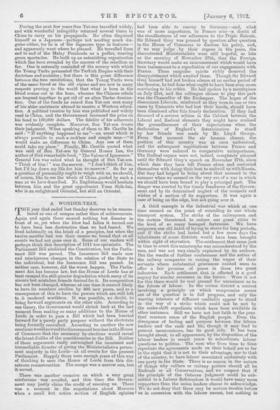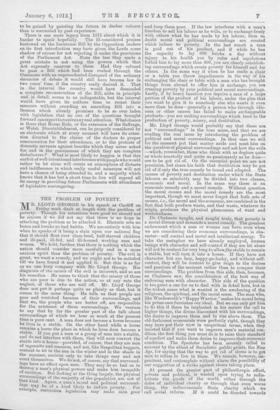A WONDER-YEAR. T HE year that ended last Sunday deserves to
be remem- bered as one of escapes rather than of achievements. Again and again there seemed nothing but disaster in front of us, yet when the blow had fallen it turned out to have been less destructive than we had feared. We lived habitually on the brink of a precipice, but when the twelve months had run their course we found that at all events we had not gone over it. Some of our readers will perhaps think this description of 1911 too optimistic. The Parliament Bill abolished the Constitution, but the Parlia- ment Bill was passed. The Insurance Bill made new and mischievous changes in the relation of the State to the individual, but the Insurance Bill was passed. In neither case, however, did the worst happen. The Parlia- ment Act has become law, but the House of Lords has at least escaped the still greater degradation which many of its sincere but mistaken friends desired for it. Its composition has not been changed, whereas at one time it seemed likely to have its numbers swollen by 400 new peers, and as a consequence of this to have the powers which are still left to it rendered worthless. It was possible, no doubt, to bring forward arguments on the other side. According to one theory, the Government would shrink back at the last moment from making so many additions to the House of Lords in order to pass a Bill which had been hurried forward for a purely party purpose without the electorate being formally consulted. According to another the new creations would so weed the Government benches inthe House of Commons that the necessary by-elections would reveal the latent dislike of the constituencies to the Bill. Neither of these arguments really outweighed the imminent and irremediable disaster of giving the Ministerialists a perma- nent majority in the Lords—at all events for the present Parliament. Happily there were enough peers of this way of thinking to save the House of Lords from this dis- astrous reconstruction. The escape was a narrow one, but it served.
There was another occasion on which a very great misfortune was avoided, and this time the Govern- ment may justly claim the credit of rescuing us. There was a moment in the negotiations about Morocco when a small but active section of English opinion had been able to convey to Germany—and, what was of more importance, to France also—a doubt of the steadfastness of our adherence to the Triple Entente.. Sir Edward Grey was pressed by question after question in the House of Commons to disclose his policy, and if we may judge .by their organs in the press, the discontented Ministerialists were still hopeful, as late as the morning of November 27th, that the Foreign Secretary would make an announcement which would have been tantamount to a repudiation of our engagements with. France. These sanguine spirits richly deserved the disappointment which awaited them. Though Sir Edward Grey himself had not broken silence at an earlier period of the Session, he had done what ought to have been even more convincing to his critics. He had spoken by a mouthpiece on July 21st, and the colleague chosen to play this part was the Chancellor of the Exchequer. The hopes of the dissentient Liberals, reinforced as they were in one or two cases by Unionists who had lost their heads, should have been dismissed after this timely declaration. If they had dreamed of a serious schism in the Cabinet between the Liberal and Radical elements they might have realized the groundlessness of their expectations when the declaration of England's determination to stand. by her friends was made by Mr. Lloyd George. From that moment the air became clearer, the. position of this country was at once understood, and the subsequent negotiations between France and Germany were reduced to comparative unimportance.. The Radical organs were not, indeed, completely silenced until Sir Edward Grey's speech on November 27th, since which date they have left France alone and contented themselves with doing their best to embroil us with Russia. But they had helped to bring about that moment in the summer when we seemed on the very eve of a war in which we should have been bound to play a principal part. The danger was averted by the timely frankness of the Govern- ment and by its determined neglect of the counsels and wishes of a section of its supporters. It was again a. case of being on the edge, but not going over it.
A third example is the industrial war which at one time seemed on the point of extending to our whole transport system. The strike of the railwaymen and the carters threatened to reduce our great cities to the level of so many besieged fortresses. We have outgrown our old habit of laying in stores for long periods, and if the strike had lasted but a few more days the inhabitants of some districts would have been brought within sight of starvation. The settlement that came just in time to avert this catastrophe was misunderstood by the men, and was not very clearly explained by its authors. But the results of further conferences and the action of the railway companies in raising the wages of their servants where substantial grievances existed seem to offer a, fair promise of peace in these two great industries. Each settlement that is effected is a good augury for similar successes in the future. Were it not for this there would be real ground for uneasiness as to . the future of labour. In the cotton district a contest involving a principle on which compromise seems out of the question. is in full progress, and only the warring interests of different coalfields appear to stand in the way of a strike which could not bo met by the make-shift expedients which have been available in other instances. Still we have not lost faith in the prae tical common sense of the English people. Even the divergence of feeling and purpose between the labour, leaders and the rank and file, though it may lead to present inconvenience, has its good side. It has been brought about, to all appearance, by the disposition of the labour leaders in recent years to subordinate labour questions to politics. The men who from time to time repudiate the agreements made on their behalf are so far in the right that it is not to their advantage, nor to that of the country, to have labour associated exclusively with one party in the State. There is no reason in the nature of things why colliers or railway porters should all be Radicals or all Conservatives, and we suspect that if the principle of the Osborne judgment could be sub- mitted to a Labour Referendum it would have many more supporters than the union leaders choose to acknowledge. We do not deny that there may be serious trouble before us in connexion with the labour unrest, but nothing is to be gained by painting the future in darker colours than is warranted by past experience. There is one more legacy from 1911 about which it is harder to speak hopefully. The ill-considered praises bestowed on. the Insurance Bill by the Opposition leaders on its first introduction may have given the Lords some shadow of excuse for not rejecting it under the provisions of the Parliament Act. None the less they made a great mistake in not using the powers which that Act expressly reserves to them. Had they refused to pass a Bill which had been rushed through the Commons with an unprecedented disregard of the ordinary decencies of debate it would still have become law in two years' time if the country really desired it. That in the interval the country would have demanded a complete reconstruction of the Bill, alike in principle and in detail, seems to us indisputable, but the interval would have given its authors time to recast their measure without crowding an amending Bill into a Session which already promises to be so over laden with legislation that no one of the questions brought forward can expect to receive any real attention. What chance is there that Homo Rule, or the extension of the Suffrage,. or Welsh Disestablishment, can be properly considered by an electorate which at every moment will have its atten- tion diverted to the claims of the doctors to proper remuneration for their attendance, or to the protests of domestic servants against benefits which they never asked for, and in the genuineness of which they are complete disbelievers P What is most likely to happen is that this surfeit of well-intentioned interference with people who would rather be let alone will create an atmosphere of distaste and indifference in which really useful measures will not have a chance of being attended to, and a majority which knows that it has but a short time to live will expend all its energy in providing future Parliaments with abundance of legislative scavengering.



















































 Previous page
Previous page